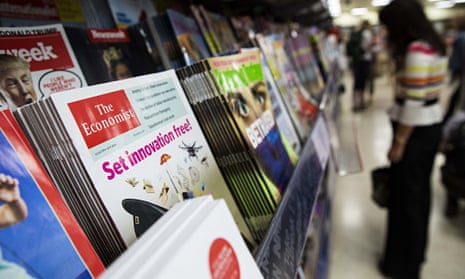Rupert Pennant-Rea sat pensively in the 14th floor boardroom above London’s upmarket St James’s and soaked up the grand views across Green Park. Colleagues greeted him warmly as they shuffled into the room. As chairman and a former editor of the Economist, Pennant-Rea was acutely aware of just what a momentous decision his board was about to take.
It was last Monday evening and the magazine and research group was poised to agree to support a deal that would result in only the second significant change of ownership in the Economist’s 172-year history.
Pearson, the education and publishing giant that has held a non-controlling 50% stake since 1928, is selling the holding for £469m. The deal will make Italy’s Agnelli family, founders of the Fiat car empire, the largest shareholder, with fellow owners reading like a Who’s Who of British business dynasties, including the Cadbury, Layton, Rothschild and Schroder families.
They are in control of a star in the British print media firmament. While other newspapers and magazines struggle to reverse shrinking circulations and halt sliding profits, the Economist appears to be in rude health. It has a weekly circulation of around 1.6m and the group, which includes research division the Economist Intelligence Unit, notched up pretax profits of £59m in 2015 on revenues of £328m.
Pearson’s move to sell most of its stake to Exor, the investment company run by the Agnellis, upholds a tradition of dynastic ownership of media assets. Rupert Murdoch owns News UK, which publishes the Sun and the Times, the Barclay brothers own the Telegraph, and the Rothermere family controls the Daily Mail titles. Overseas, the Sulzberger family owns the New York Times, the Springers control huge chunks of German media and the Bonnier family owns a large publishing portfolio in Sweden. Newspapers have long been the playthings of wealthy media barons who are seduced by the access and influence they bring.
Douglas McCabe, chief executive of media specialists Enders Analysis, says: “The simple reality is that the economics of providing news, particularly investigative and carefully curated and researched information, requires investment. Those businesses are not best owned by someone looking for profits in the short term.” He says this is why media assets often end up being owned by investors who can afford to take a longer-term view on value such as private, family firms.
Exor was already a 4.7% shareholder in the Economist Group but will boost its position to 43% by snapping up the bulk of Pearson’s stake. John Elkann, chief executive of Exor and grandson of industrialist Gianni Agnelli, has been on the Economist’s board since 2009. A source close to Exor insists: “He is a passionate believer in the future of news media.”
The deal, which contains commitments to preserve and nurturing the Economist’s brand of journalism, was backed by four of the magazine’s editors, including current boss Zanny Minton Beddoes and former editors Pennant-Rea, Andrew Knight, Bill Emmott and John Micklethwait.
Despite inheriting a huge circulation, Exor’s biggest challenge will be to attract similar numbers of younger readers to the magazine’s digital offering. This has proved a tough nut to crack. Economist readers enjoy poring over the weighty analysis of complex issues, often spread over thousands of words. Readers of digital news prefer short, sharp bursts of information – “snacking media”.

Elkann hinted at this challenge in his statement: “We are convinced of the huge potential that still lies ahead and particularly in the Economist’s ability to seize the many development opportunities linked to the digitisation of the media industry.”
The omens are pretty good. Latest figures from the Audit Bureau of Circulations reveal that news and current affairs magazines bucked the downward trend across the rest of the magazine market over the first six months of 2015. Private Eye and the Economist increased circulations by 4.6% and 1.9% respectively year-on-year. The Economist also notched the largest rise in online circulation, with a jump of 225.8% in the first six months compared with the same period in 2014.
It is thought that rival publishers such as Bloomberg and Hearst were keen to grab some of this potential but were given short shrift by the group’s independent trustees, who have the power to veto undesirable bidders to protect editorial independence. A source close to the deal says: “I don’t think there was a long list of suitors who could satisfy all the criteria. It was a slightly unusual process as they [Pearson] were the vendor, but the trustees had a veto on who could buy the shares.”
It became clear pretty quickly to all involved that existing shareholders were the most likely buyers of the stake.
Another source said Elkann was a “known quantity” to decision-makers at Pearson, which last month sold the Financial Times to Nikkei of Japan for £844m. He was regarded by Pearson and Economist executives as someone with an “agreeable personality” who was “constructive in his role on the board”. His insider status gave Exor a perfect launchpad, while outside parties would have struggled to clear the hurdles put in place to ensure editors and writers were free of interference from an overbearing owner. This includes a 20% cap on voting rights and 50% limit on share ownership.
In addition, the deal requires approval from a 75% majority of Economist shareholders. Under the deal, Exor will hold a 43% stake; the next biggest shareholder is the Rothschild family with 26%.
The Economist Group itself has agreed to buy out the rest of Pearson’s stake for £182m, which it will fund by selling its HQ in plush St James’s. Pennant-Rea may have to forgo his grand view over Green Park, but he will hope he has secured the magazine’s future for the next 172 years.

Comments (…)
Sign in or create your Guardian account to join the discussion